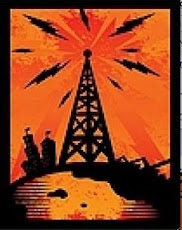
Recently I was honored by an invitation from the Richmond Amateur Radio Club (RARC) to speak about my research, and I think I've encountered a potentially important resource for my studies - and for our nation and local community.
Though I'm just beginning to learn about HAM radio and other 'old-school' radio technologies, it was immediately clear to me that in the audience of several dozen members who gathered for their monthly dinner meeting there was a collection of important technical know-how that should be gathered and digitally recorded for future operators.
In our digital age of Web 2.0 we tend to become so enchanted with new techno-toys that we dismiss, overlook or forget the power of more ancient and stable media like radio. Rather than discarding elder technologies and knowledge, we might more profitably compose a thoughtful hybrid of the new and the old. For example, on the Internet Archive website, you can type "amateur radio" in the search box and you'll find W2XBS George Bowen's "This Week in Amateur Radio # 735 with streaming audio news stories about the wisdom and utility of amateur radio during times of emergency.
How can we most powerfully combine radio technology with newer Web technologies? In his influential 1964 text Understanding Media, Canadian media theorist Marshall McLuhan notes how various "media...depend upon us for their interplay and their evolution" (73) and he observes the tremendous power unleashed by hybrid forms. The etymological root meaning of "hybrid" is fascinating: the offspring of a wild boar and a domestic sow - but which is the new tech and which is the old? McLuhan advocates "the hybrid principle as a technique of creative discovery." (80) Since most of the audience raised their hands when I asked who regularly got online to surf the Web, it may be that RARC members are already deploying hybrid media.
RARC's collective knowledge "amateur" radio technology is impressive, and important.
I'm hoping that, in the absence of a large audio archive project, RARC at least has an active mentorship program so that their knowledge can be passed on and we'll have it next time we're in trouble. In times of political, financial or weather emergency, amateur radio operators voluntarily form webs of communication that empower rescue and recovery when younger, more vulnerable technologies fail. While Katrina provided a notable example of this, many at the meeting had their own stories of disasters that they helped address via amateur radio networks. I'd love to get a few of those stories posted here!







